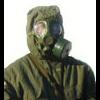
Allergic Rhinitis
#1
Posted 17 July 2014 - 09:32 PM
#2
Posted 18 July 2014 - 12:56 AM
Along with antihistamines and inhaled steroids, you could try c60-olive oil. It has some impressive anti-allergy properties that have been evident in cases of asthma and eczema. It's not expensive. For a lot more money, you could look into infecting yourself with therapeutic helminths. There have been reports of major improvements in allergies from that.
#3
Posted 18 July 2014 - 02:03 AM
I had bad seasonal allergies after my injury. Mine also disappeared when I was half way around the world in some third world jungle. Loved feeling healthy again.
Paleo style diet was incredibly helpful. Giving up grains and coffee. Treating my other injuries helped as well. Once I got my bones healed and my hormones got back in line I started exercising again. A hard work out regimen seemed to calm down my immune system. By the time I started more advanced peptide therapy they seemed to be gone.
I liked the Chinese patent medicine Bi Yan Pian and quercetin to stop flare ups.
#4
Posted 18 July 2014 - 08:41 AM
I live in the UK as well and have been allergic to pollen, dust, cat dander and mold from the age of about 7 to now (48). My symptoms were heavy, not as bad as yours or niner's, but I would lose a day off work occasionally with hay fever, where I would spend the entire day in bed, and most days, even in winter, would sniffle constantly and sneeze due to dust mites and bed mites.
For almost a year now I've been taking Reishi, Chaga and Guduchi/Tinospora Cordifolia, and my problems seem to be sorted. Dust is no longer a problem, I can get covered in it now, and interact with cats without any effect.
Reishi contains beta-glucans (as does Chaga) that modulate the immune system, and triterpenes that mainly act as anti-histamines. Reishi and Chaga both contain a bunch of other stuff that can help as well - Chaga is allegedly a dense source of Pantothenic Acid, which helps with nasal congestion. Guduchi (Tinospora Cordifolia) is used in Ayurveda and is an immune system modulator amongst other things, and is apparently very effective for nasal congestion and sneezing.
I take Reishi and Chaga with Vitamin C, which helps too, and also aids the breakdown of large Reishi polysaccharides/beta-glucans into more easily absorbed molecular sizes; two pills a day of each of Reishi and Chaga, and two of Guduchi. It's a lot of pills but they do the job and there may be other health benefits. On the worst pollen days I can still feel a tingle of pollen going up my nose, but it doesn't develop into anything - on those days, for safety, I may also take a dose of MSM, which blocks the receptivity of histamine in the nasal passages, and maybe some activated Quercetin if I've got any. It may take a couple of weeks for most of these to kick in, and I think the immune modulating effect of Reishi and Chaga could be a medium to long term thing to get the full effect.
I usually suffer badly at ash pollen season (March) and grass pollen season (June-ish) onwards, and live next to parkland with plenty of both, but this year for the first time I've had no allergy symptoms, even with my face buried in grass doing press ups, and I no longer carry a handkerchief around. Like you I have a clean diet an exercise a lot. Your suffering is worse than mine, but perhaps these can help reduce your symptoms at least - read up a bit first though, e.g. Reishi can have a few minor side effects and interactions with other medication.
Edited by MiddleAged49, 18 July 2014 - 08:42 AM.
#5
Posted 18 July 2014 - 09:21 AM
#6
Posted 19 July 2014 - 11:23 AM
Thanks all - on the next good day I will look into all of those, especially the reishi and the c60....
#7
Posted 31 August 2014 - 05:45 PM
Habana, your post is incredibly well written. I wish I could write like that on a bad day. :-)
Description of your symptoms very closely matches my own experience.
May I ask, did you have such "bad days" prior to the development of your allergic rhinitis?
#8
Posted 03 September 2014 - 10:04 AM
Sadly, I can neither read nor talk on a bad day, so there are trade-offs ![]()
No, the "bad days" are purely something that I have experienced in the last ten or so years.
I am currently subsisting on a combination of:
*anti-histamines (intra-nasal & oral), generic decongestants, vitamin-C & modafinil*
The modafinil has been a bit of a god-send in terms of helping me to function better during the day, especially in the mornings when I feel like an amoeba.
And the daily trip to the gym/squash/steam room is the most effective of all; but to be fair, it's contingent upon the meds doing a good enough job to allow me to get there in the first place....
#9
Posted 03 September 2014 - 02:37 PM
Drink more water, water will allow your body to naturally flush out the histamine. Also perhaps try azelastine nasal spray, this is a topical antihistamine that should also help. Good luck!
#10
Posted 03 February 2015 - 05:49 AM
has anyone tried Bionase for allergies? it's definitely interesting...
http://www.syrolight.com/bionase
and there seems to be an extremely cheap (probably counterfeit) device available on alibaba:
http://www.aliexpres...2924963872
#11
Posted 25 January 2016 - 12:49 PM
I have problems with dust easily replenishing itself in my room every day and it's hard to breath in here. Any time I go to sleep I end up waking up feeling worse. Such a dreadful lifeless feeling to even get out of bed at that point. The longer I avoid bed the better i feel usually. I have nasal agitations that always get worse in bed. I don't know what to do. I am barely functioning much at all these days. I have some reishi to try but whatever. so much fog, can't think.
What supplements should be avoided in cases of dust and possible mould allergies? Any general rules or guidelines?
And which specific anti-histamines are worth trying? They used to make me sleepy and foggy a lot when I used them for seasonal allergies.
Edited by AlexCanada, 25 January 2016 - 12:50 PM.
Also tagged with one or more of these keywords: allergic rhinitis, allergies, sinusitis, allergens, hayfever, dust mites, mucus, post-nasal drip
Science & Health →
AgingResearch →
Eating Meat Fed with AllergensStarted by Jiminy Glick , 10 Jan 2019 |
|

|
||
Science & Health →
Medicine & Diseases →
Allergy Vaccines, good or bad for aging?Started by YOLF , 10 Oct 2017 |
|

|
||
Science & Health →
Supplements →
Useful Treatment for Sinus/Bronc infections & posb. AlergiesStarted by RiDDIM , 19 Jul 2017 |
|

|
||
Science & Health →
Supplements →
NAD+ →
The strange case of Niki and NiagenStarted by Oakman , 12 Jun 2017 |
|

|
||
Round Table Discussion →
Business →
Retailer/Product Discussion →
Claritin™ Alternatives for AllergiesStarted by jroseland , 15 Oct 2016 |
|

|
0 user(s) are reading this topic
0 members, 0 guests, 0 anonymous users



















































